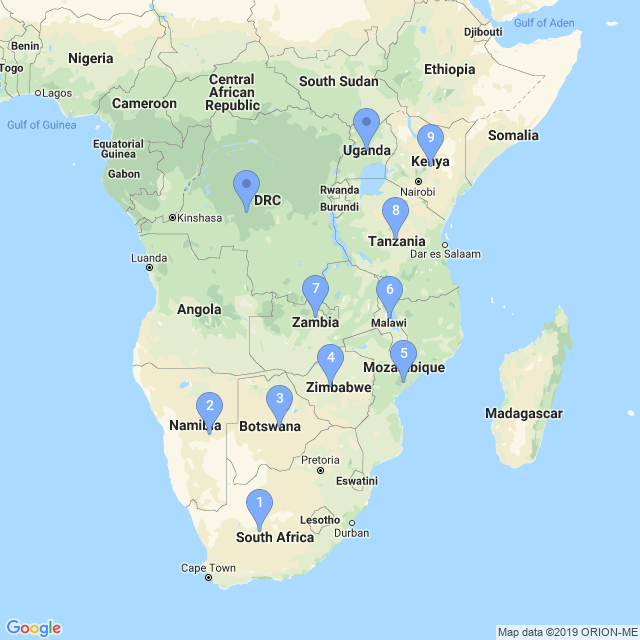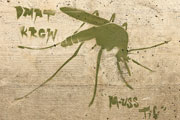Recommended Vaccines for Travel to Africa: Vaccinations for African Safari Trips
Our consultants often deal with clients who are anxious about various medical concerns before their trips, the main one being what vaccinations are needed for Africa. It’s not quite as simple as ‘Africa’ – considering Africa covers over 30 million km2 – and different areas have different vaccination requirements.
That’s why we’ve put together this comprehensive blog, detailing exactly what shots you need for the countries in southern and East Africa that our safaris visit, when to get them, and where.
IMPORTANT NOTE/DISCLAIMER:
This is a general, basic overview of some vaccinations needed for safaris. Before traveling to Africa, every person should visit their own doctor or local travel clinic, well in advance of their departure, to obtain advice. Each person is different and has different underlying conditions, allergies, etc., so a pre-trip health check and discussion of what vaccines and malaria prophylaxis are necessary, and other health concerns, are imperative.
This blog does not replace the advice of your doctor/travel nurse.
Medical Insurance
This is a non-negotiable must. Before traveling to Africa, be sure to get good medical insurance, including medical evacuation. Many areas visited are far from medical facilities and difficult to reach. Should there be a medical emergency, you want to feel safe in the knowledge that your insurance will cover any eventuality. Check out our full section on medical insurance on how to get it.
Recommended Vaccines for Travel to Africa
The only vaccine that is compulsory in some countries (i.e. you won’t be allowed across the border without proof of vaccination) is the yellow fever vaccine, but there are many recommended shots in others. We have a whole blog on yellow fever, so head over there for all things yellow fever, including a map of where it is endemic.
Remember to check that all your routine childhood vaccinations – which in most countries include tetanus, diphtheria, whooping cough, measles, mumps, rubella, polio, TB and meningitis – were done and get boosters where necessary. You can also discuss getting various optional shots, like the flu and pneumococcal shots, with your healthcare provider/travel clinic.
The choice of whether to get the recommended vaccinations or not depends on a number of things including:
- Where you’re traveling to in each country e.g. rural vs. urban
- Local outbreaks e.g. cholera
- Length of stay
- What your accommodation will be e.g. camping vs. 5-star hotel
- Activities you’re going to be involved in e.g. swimming in dams, helping out at a clinic, being involved in veterinary work
- Your medical history e.g. underlying conditions, medicines that may affect immunity
- Vaccination history i.e. did you receive all your childhood immunizations?
Local outbreaks/Travel warnings
Outbreaks of diseases such as cholera do, at times, occur and this will mean that you may need to get a specific vaccine for that outbreak (or, in severe cases, avoid travel to some places). The Centre for Disease Control (CDC) publishes these travel warnings and it’s advisable to keep an eye on these in the build-up to your safari.
When to get your vaccinations for African safari travel
Remember that vaccinations may take a little while to work and some are given over a couple of days/weeks, sequentially. This means you may need to visit your doctor/travel clinic on a couple of occasions if you need to get numerous shots, so go as early as possible.
To help you plan, here we’ll list the most common shots recommended for an African safari (there are numerous other vaccines that you could consider prior to your African safari, depending on all risk factors), how the disease they protect you against is spread, how long they take to work and who the American Advisory on Immunization Practices (ACIP), Centre for Disease Control and/or World Health Organisation (WHO) recommends gets them. Later in the blog, we will list each country our safaris visit and specify what’s needed for where.
Cholera
Transmission: food and water
Recommended for: at-risk travelers to an area of active cholera transmission
How long before entering the area should the vaccine be given: > 10-14 days
Diphtheria
Transmission: person-to-person (air-borne)
Recommended for: all travelers should be up-to-date with the diphtheria toxoid vaccine
How long before entering the area should the vaccine be given: Boosters are given every 10 years
Hepatitis A
Transmission: person-to-person, food and water
Recommended for: all travelers to countries with high or intermediate HAV endemicity
How long before entering the area should the vaccine be given: > 1 month/as soon as possible (3 doses)
Hepatitis B
Transmission: blood and body fluids
Recommended for: all unvaccinated travelers to areas with a prevalence of HBV infection
How long before entering the area should the vaccine be given: as soon as possible (3 doses)
Meningitis
Transmission: person-to-person (air-borne)
Recommended for: travelers to parts of sub-Saharan Africa known as the “meningitis belt”
How long before entering the area should the vaccine be given: > 10 days
Polio
Transmission: Faecal-oral, oral-oral
Recommended for: travelers to areas that have polio should ensure that they have completed the recommended age-appropriate polio vaccine series and that adults have received a single lifetime IPV booster dose. In addition, a booster dose for certain adult travelers to some countries that border areas with polio is recommended
How long before entering the area should the vaccine be given: > 4 weeks (booster)
Rabies
Transmission: animal bites
Recommended for: travelers to rabies-endemic countries who may come in contact with animals
How long before entering the area should the vaccine be given: > 1 month (3 doses)
Tetanus
Transmission: non-intact skin, injuries/bites from contaminated objects
Recommended for: travelers who do not have up-to-date immunization (10-yearly booster)
Typhoid
Transmission: food and water, fecal-oral
Recommended for: travelers to areas where there is an increased risk of exposure
How long before entering the area should the vaccine be given: > 2 weeks
Yellow fever
Transmission: mosquito-borne
Compulsory for: all travelers≥ 9 months of age to areas with yellow fever risk
How long before entering the area should the vaccine be given: > 10 days
Where to get vaccinations for travel to Africa
The best place to go and get advice on what shots to get for your African safari is a travel clinic. Most major towns across the world have specialist travel clinics, so seek out the nearest one. If there isn’t one close, get your doctor to call one and then you can decide which shots you should have for the specific countries you’re visiting.
While you’re at the doctor, have a general check-up, stock up on any meds you take chronically (and get an official prescription, with generic names. Keep a copy with your passport). Remember that some medications may not be available in the countries you visit on your safari, so go prepared. If you want an overview of all things health-related, see our blog, The Complete African Safari Medical Guide.
Country-specific vaccinations for African travel
Vaccinations for South Africa travel
Required vaccinations: proof of yellow fever vaccination, if traveling from or transited (> 12 hours spent) through a yellow fever endemic country
Recommended shots: routine vaccinations should be up-to-date; hepatitis A; hepatitis B, if going to be exposed to blood/body fluids (including sexual contact); typhoid, if going to be traveling in rural areas
Consider: cholera, diphtheria, tetanus, rabies, flu, meningococcal and others (dependent on risk)
Vaccinations for travel to Namibia
Required vaccinations: proof of yellow fever vaccination, if traveling from or transited (> 12 hours spent) through a yellow fever endemic country
Recommended: routine vaccinations should be up-to-date; hepatitis A; hepatitis B, if going to be exposed to blood/body fluids (including sexual contact); typhoid, if going to be travelling in rural areas
Consider: cholera, diphtheria, tetanus, rabies, flu, meningococcal and others (dependent on risk)
Vaccinarions for Botswana safari trips
Required vaccinations: proof of yellow fever vaccination, if traveling from or transited through a yellow fever endemic country
Recommended shots: routine vaccinations should be up-to-date; hepatitis A; hepatitis B, if going to be exposed to blood/body fluids (including sexual contact); typhoid, if going to be traveling in rural areas
Consider: cholera, diphtheria, tetanus, rabies, flu, meningococcal and others (dependent on risk)
Vaccinations for travel to Zimbabwe
Required vaccinations: proof of yellow fever vaccination, if traveling from or transited (> 12 hours spent) through a yellow fever endemic country
Recommended shots: routine vaccinations should be up-to-date; hepatitis A; hepatitis B, if going to be exposed to blood/body fluids (including sexual contact); typhoid, if going to be traveling in rural areas
Consider: cholera, diphtheria, tetanus, rabies, flu, meningococcal and others (dependent on risk)
Vaccinations for Mozambique holidays
Required vaccinations: proof of yellow fever vaccination, if traveling from or transited (> 12 hours spent) through a yellow fever endemic country
Recommended shots: routine vaccinations should be up-to-date; hepatitis A; hepatitis B, if going to be exposed to blood/body fluids (including sexual contact); typhoid, if going to be traveling in rural areas
Consider: cholera, diphtheria, tetanus, rabies, flu, meningococcal and others (dependent on risk)
Vaccinations for travel to Malawi
Required vaccinations: proof of yellow fever vaccination, if traveling from or transited (> 12 hours spent) through a yellow fever endemic country
Recommended: routine vaccinations should be up-to-date; hepatitis A; hepatitis B, if going to be exposed to blood/body fluids (including sexual contact); typhoid, if going to be travelling in rural areas
Consider: cholera, diphtheria, tetanus, rabies, flu, meningococcal and others (dependent on risk)
Vaccinations for Zambia safari trips
Required vaccinations: proof of yellow fever vaccination, if traveling from or transited (> 12 hours spent) through a yellow fever endemic country
Recommended shots: routine vaccinations should be up-to-date; hepatitis A; hepatitis B, if going to be exposed to blood/body fluids (including sexual contact); typhoid, if going to be traveling in rural areas
Consider: cholera, diphtheria, tetanus, rabies, flu, meningococcal and others (dependent on risk)
Vaccinations for Tanzania safaris
Required vaccinations: proof of yellow fever vaccination, if traveling from or transited (> 12 hours spent) through a yellow fever endemic country
Recommended vaccinations: routine vaccinations should be up-to-date; hepatitis A; hepatitis B, if going to be exposed to blood/body fluids (including sexual contact); typhoid, if going to be traveling in rural areas
Consider: cholera, diphtheria, tetanus, rabies, flu, meningococcal and others (dependent on risk)
Vaccinations for Kenya safaris trips
Required shots: proof of yellow fever vaccination for all travelers traveling from a country with a risk of YFV transmission and all of those visiting yellow fever-endemic regions of the country
Recommended: routine vaccinations should be up-to-date; hepatitis A; hepatitis B, if going to be exposed to blood/body fluids (including sexual contact); typhoid, if going to be travelling in rural areas
Consider: cholera, diphtheria, tetanus, rabies, flu, meningococcal and others (dependent on risk)
Vaccinations for travel to Uganda
Required vaccinations: yellow fever vaccination is recommended for all travelers and proof is required if traveling from YFV endemic country
Recommended shots: routine vaccinations should be up-to-date; hepatitis A; hepatitis B, if going to be exposed to blood/body fluids (including sexual contact); typhoid, if going to be traveling in rural areas
Consider: cholera, diphtheria, tetanus, rabies, flu, meningococcal and others (dependent on risk)
What vaccines do you need for the Democratic Republic of Congo (DRC)?
Required vaccinations: proof of yellow fever vaccination for all travelers
Recommended: routine vaccinations should be up-to-date; hepatitis A; hepatitis B, if going to be exposed to blood/body fluids (including sexual contact); typhoid, if going to be traveling in rural areas
Consider: cholera, diphtheria, tetanus, rabies, flu, meningococcal and others (dependent on risk)
Vaccinations are not 100% effective
Please remember that no vaccine protects you 100%. The most important way to not get an infectious disease – after vaccination – is to avoid the causes.
This means, amongst other measures, mosquito repellants and nets and covering up between dusk and dawn, to avoid mosquito bites (yellow fever and malaria), drinking bottled water (no ice!), being careful about what you eat, and washing fruits well before eating, using condoms and avoiding risky behavior.
On the matter of malaria, for which there is no vaccination, chemoprophylaxis is recommended in endemic areas (many of the places our trips go). See our blog Malaria made simple.
Planning well & being prepared = dream safari trip
That, in a nutshell, is what you need to do regarding getting your vaccines after you’ve booked your dream African safari. As discussed, only the yellow fever vaccine is compulsory – if going to, or passing through, a yellow fever endemic country.
The rest of the recommended vaccines for travel to Africa can be decided on, in consultation with your travel health consultant, according to the current risks in the areas you’re traveling to and your personal health. Speak to our consultants for more guidance about what vaccinations you need to travel to Africa.
Here’s to a magnificent, healthy African safari!
If you liked this post, these trips cover similar ground…
- 4 Day Private Garden Route Tour from Cape Town (return)
- 6 Day South Africa Safari - Garden Route Small Group Tour





__medium.jpg)

__medium.jpg)
__medium.jpg)





__medium.jpg)




 Briony is a qualified pharmacist, published author and travel blogger living in Cape Town. She writes her own blog about travel, the arts, music and the good things in life, with a focus on accessibility. She likes watching the world go by, and sometimes it makes her nose twitchy, but mostly it provides golden nuggets with which to light up the page.
Briony is a qualified pharmacist, published author and travel blogger living in Cape Town. She writes her own blog about travel, the arts, music and the good things in life, with a focus on accessibility. She likes watching the world go by, and sometimes it makes her nose twitchy, but mostly it provides golden nuggets with which to light up the page.








